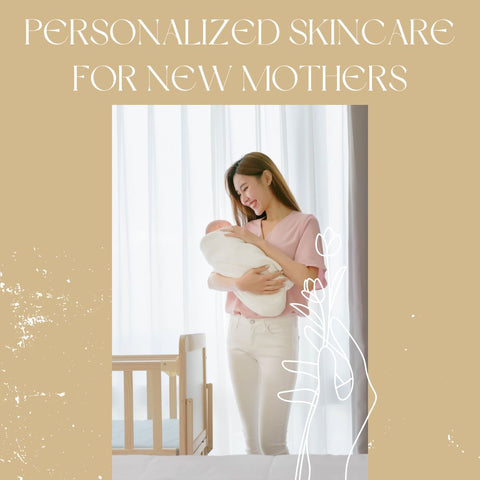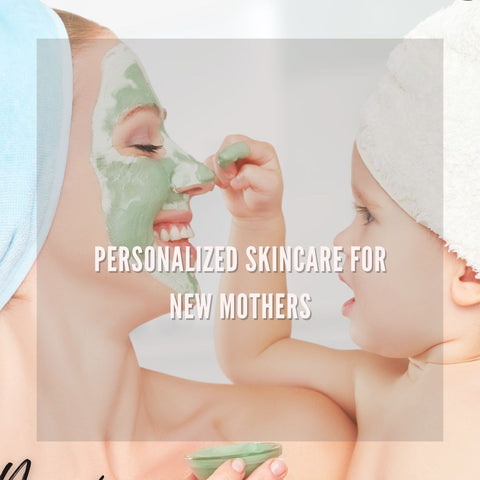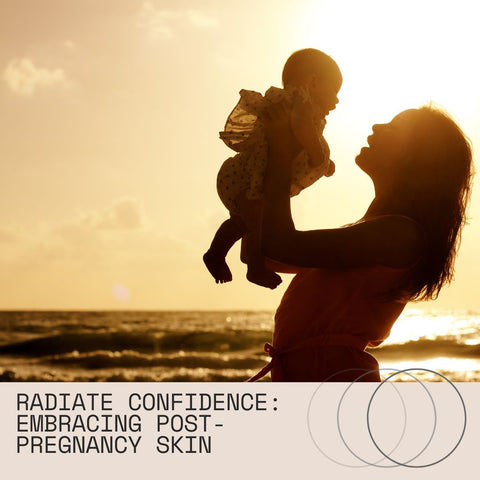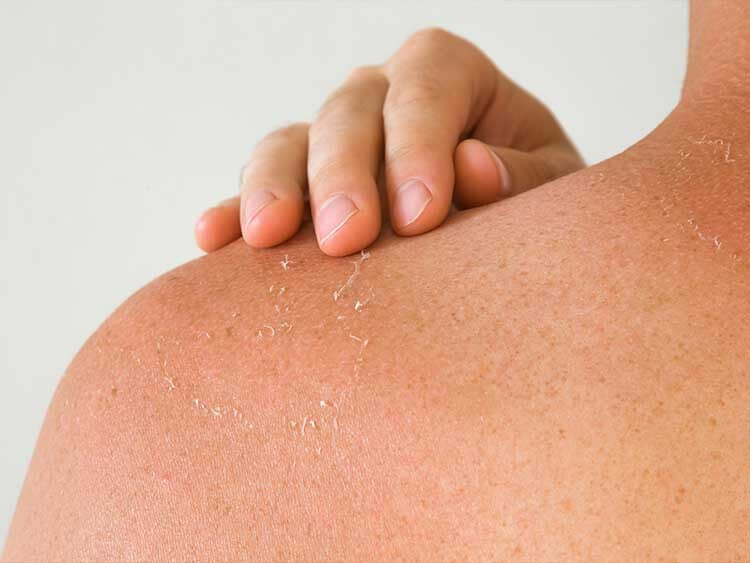Postpartum skincare is essential for nurturing your skin after pregnancy, as your body goes through significant changes during this time. Here are some expert tips for a postpartum skincare routine:
The Postpartum Skincare Journey: What to Expect

Postpartum skincare demands patience and self-care. Establishing a moderate skincare routine, staying hydrated, eating a balanced diet, and getting enough sleep will all assist in improving skin health during this transitional period. Consulting with a dermatologist or skincare professional can provide personalised recommendations based on your specific needs and problems.
Understanding Hormonal Changes: The Impact on Postpartum Skin
Hormonal changes play an important role in postpartum skin health. Here's how these fluctuations affect the skin:
-
Hormonal fluctuations, especially an increase in androgens such as testosterone, can cause an increase in oil production. This excess oil can clog pores and lead to acne breakouts, particularly on the face, chest, and back.
-
Pregnancy hormones such as oestrogen and progesterone can stimulate the production of melanin, the pigment that gives skin its colour. This can result in hyperpigmentation, also known as melasma, which causes dark patches to appear on the face, especially on the cheeks, forehead, and upper lip.
-
Changes in hormone levels can also have an impact on skin hydration and barrier function. Some women may experience dryness and increased sensitivity, making their skin more susceptible to irritation and discomfort.
-
Stretch marks can develop as a result of hormonal changes and physical stretching of the skin during pregnancy. These marks frequently appear on the abdomen, breasts, thighs, and buttocks and may fade with time but remain visible.
-
Hormonal fluctuations after childbirth can also influence hair growth and texture. Many women experience postpartum hair loss, also known as telogen effluvium, which is a temporary shedding of hair that usually occurs three to six months after childbirth. Furthermore, hormonal changes can affect the texture and thickness of hair.
-
Hormonal changes can have an impact on the body's ability to heal, especially in areas where there has been trauma or surgery, such as caesarean section incisions or episiotomy. Proper wound care and skincare are essential for promoting healing and preventing complications.
Gentle Care: Navigating Skincare After Childbirth
In order to meet the special requirements of postpartum skin, managing skincare after childbirth necessitates a kind and gentle approach. This is a guide to help you take care of your skin during this period of change:
-
Begin with a basic skincare routine that includes gentle, hydrating products. Avoid using harsh chemicals, fragrances, and exfoliants, especially if your skin is sensitive or undergoing changes.
-
Use a gentle, soap-free cleanser to wash your face twice a day. Look for products that are specifically formulated for sensitive or postpartum skin to avoid stripping away natural oils.
-
Moisturise your skin on a regular basis to support its natural barrier function and prevent dryness. To avoid clogging your pores, choose a lightweight, non-comedogenic moisturiser.
-
Protect your skin from the sun's harmful UV rays by using a broad-spectrum sunscreen with an SPF of 30 or higher every day. This is especially important when dealing with hyperpigmentation or melasma.
-
If you have acne breakouts, look for gentle spot treatments that contain ingredients like benzoyl peroxide or salicylic acid. Consider using products containing vitamin C, niacinamide, or licorice extract to brighten and even out skin tone.
-
Stretch marks may fade with time, but there are skincare products available to help improve their appearance. Look for creams or oils that include ingredients like retinoids, hyaluronic acid, or collagen-boosting peptides.
-
Drink plenty of water to keep your skin hydrated from the inside out, and focus on eating a balanced diet rich in fruits, vegetables, and essential nutrients to support overall skin health.
-
Take time for self-care activities that promote relaxation and reduce stress, such as meditation, yoga, or gentle exercise. Managing stress can help improve skin health and overall well-being.
-
If you're unsure about which products or treatments are safe and effective for postpartum skin, consider consulting with a dermatologist or skincare professional. They can provide personalized recommendations based on your skin type, concerns, and any specific needs you may have.
Preventing and Managing Stretch Marks: Postpartum Strategies
Postpartum stretch marks can be prevented and managed with a combination of proactive skincare, healthy lifestyle habits, and patience. While it is difficult to remove stretch marks, especially once they have formed, there are steps you can take to reduce their appearance and improve skin health.
-
Hydration: Keep your skin hydrated by drinking plenty of water and applying moisturisers containing hyaluronic acid, shea butter, or cocoa butter. Hydrated skin is more supple and elastic, which can help prevent new stretch marks and improve the appearance of those that already exist.
-
Healthy Diet: Eat a well-balanced diet high in vitamins, minerals, and antioxidants to promote skin health from within. Foods rich in vitamin C, vitamin E, zinc, and collagen-boosting nutrients can aid in skin elasticity and repair.
-
Frequent Exercise: To increase skin elasticity and circulation, do light exercise on a regular basis. Walking, swimming, and prenatal yoga can all help keep your body and skin healthy during and after pregnancy.
-
Gradual Weight Gain: While weight gain is normal during pregnancy, try to avoid rapid or excessive weight gain, as this can contribute to the development of stretch marks. Aim for a gradual and steady weight gain throughout your pregnancy, as advised by your healthcare provider.
-
Topical Treatments: Apply skincare products designed specifically to treat stretch marks, such as creams, oils, or serums containing retinoids, vitamin C, collagen, or peptides. These ingredients can help to improve skin texture, stimulate collagen production, and reduce the appearance of stretch marks over time.
-
Massage: Using moisturising oils or creams on a regular basis can help improve circulation, stimulate collagen production, and increase skin elasticity. Focus on areas prone to stretch marks, such as the abdomen, hips, thighs, and breasts.
-
Laser Therapy and Microneedling: If you want more advanced treatments, talk to your dermatologist or skincare professional about laser therapy or microneedling procedures. These treatments can stimulate collagen production and reduce the appearance of stretch marks, but multiple sessions may be required for the best results.
-
Acceptance and Self-Care: Remember that stretch marks are a normal part of the body's changes during pregnancy and childbirth. During this transformative time, practise self-love and acceptance, and prioritise your own and your baby's needs.
Expert Advice for Post-Baby Glow

Achieving a post-baby glow entails nurturing your skin from within and adopting a skincare routine tailored to your needs as a new mother. Stay hydrated, eat a good diet, get enough sleep, follow a moderate skincare routine, exfoliate on a regular basis, get a facial massage, use sunscreen, take time for self-care, and be patient and kind to yourself. By following this professional advice and adopting a holistic approach to skincare and self-care, you can nurture your skin and achieve a bright post-baby glow that reflects your inner vigour and delight.
The Science of Postpartum Skin Rejuvenation
Postpartum skin rejuvenation entails understanding the physiological changes that occur during and after pregnancy, as well as implementing targeted skincare strategies to address specific needs. Here's a closer look at the science of postpartum skin rejuvenation, including hormonal changes, collagen and elastin, melanin production, and stretch marks. To revitalise postpartum skin, address these specific concerns with targeted skincare ingredients and treatments:
-
Include hydrating ingredients like hyaluronic acid and glycerin in your skincare routine to replenish moisture and improve skin barrier function.
-
Use gentle exfoliants with alpha hydroxy acids (AHAs) or beta hydroxy acids (BHAs) to remove dead skin cells, promote cell turnover, and improve skin texture.
-
Consider using skincare products with retinoids, vitamin C, niacinamide, and peptides to treat acne, hyperpigmentation, and fine lines.
-
Use a broad-spectrum sunscreen every day to protect your skin from UV damage and prevent further hyperpigmentation and premature ageing.
-
To address specific postpartum skin concerns such as melasma, stretch marks, or loss of skin firmness, consult with a dermatologist or skincare professional. Advanced treatments may include chemical peels, microdermabrasion, laser therapy, or microneedling.
Combatting Hormonal Acne After Pregnancy
Combating hormonal acne after pregnancy necessitates a targeted approach that addresses the underlying hormonal imbalances while also catering to your skin's unique requirements. Here are some strategies for managing hormonal acne postpartum:
-
If you have persistent hormonal acne, consult a dermatologist for personalised treatment recommendations. They can evaluate your skin's condition and suggest appropriate medications or procedures.
-
Use a gentle, non-comedogenic cleanser to wash your face twice a day. Avoid harsh or abrasive cleansers, which can deplete the skin's natural oils and worsen acne.
-
To help control acne breakouts, use topical treatments containing ingredients such as benzoyl peroxide, salicylic acid, or topical retinoids. These ingredients can help clear clogged pores, reduce inflammation, and prevent new blemishes from appearing.
-
In some cases, hormonal therapy may be required to control hormone levels and treat hormonal acne. A healthcare provider may prescribe oral contraceptives, spironolactone, or other hormonal medications to help balance hormones and treat acne.
-
Identify and avoid factors that can aggravate hormonal acne, such as stress, certain foods (such as dairy or high-glycemic foods), and harsh skincare products.
-
To keep your skin hydrated without clogging pores, apply a lightweight, noncomedogenic moisturiser. Hydrated skin is more likely to heal and resist acne-causing bacteria.
-
Wearing a broad-spectrum sunscreen with an SPF of 30 or higher every day will protect your skin from the sun's harmful UV rays. Some acne medications can increase sensitivity to sunlight, so sun protection is essential to avoid further irritation and hyperpigmentation.
-
Maintain a healthy lifestyle by eating a well-balanced diet, staying hydrated, exercising regularly, and managing stress. These habits can help to improve overall skin health and alleviate the severity of hormonal acne.
-
Hormonal acne can take time to resolve, so be patient and consistent with your skincare routine and treatment plan. It may take some trial and error to find the right combination of products and medications that work for your skin.
By implementing these strategies and consulting with a dermatologist or healthcare provider, you can effectively manage hormonal acne after pregnancy and achieve clearer, healthier skin.
Hydrating Your Skin: A Crucial Postpartum Step
Hydrating your skin is essential postpartum because it helps restore moisture balance, supports skin barrier function, and promotes overall skin health. Here's how to keep your skin adequately hydrated after childbirth:
-
Drink Plenty of Water: Maintaining hydration from the inside out is critical for healthy skin. Aim to drink at least 8-10 glasses of water per day to stay hydrated and support skin elasticity.
-
Use a Hydrating Moisturiser: Select a hydrating moisturiser that contains hyaluronic acid, glycerin, ceramides, or squalane. These ingredients help to attract and retain moisture in the skin, keeping it soft, supple, and moisturised.
-
Apply Moisturiser After Showering: After showering or bathing, apply moisturiser to damp skin to seal in moisture and prevent transepidermal water loss. This helps to keep your skin hydrated for longer periods.
-
Use a Humidifier: If your home's air is dry, particularly during the winter or in arid climates, consider using a humidifier to add moisture to the air. This can help keep your skin from getting dry and parched.
-
Avoid Hot Water: Hot water can deplete the skin's natural oils and cause dryness. Opt for lukewarm water when washing your face or showering to prevent drying out your skin.
-
Limit Exfoliation: While exfoliation can help remove dead skin cells and promote cell turnover, over-exfoliating can strip the skin of its natural oils and lead to dryness. Limit exfoliation to 1-2 times per week, and choose gentle exfoliants that won't irritate or damage the skin.
-
Protect Your Skin: Wear sunscreen every day to shield your skin from the sun's harmful UV rays, which can cause dryness, premature ageing, and other skin issues. Choose a broad-spectrum sunscreen with an SPF of 30 or higher and reapply as needed, especially if you plan to spend time outside.
-
Eat Foods Rich in Essential Fatty Acids: Include foods high in essential fatty acids in your diet, such as salmon, avocado, nuts, and seeds. These nutrients promote skin health and hydration from within.
-
Consider Hydrating Masks: Use a hydrating mask 1-2 times per week to give your skin an extra boost of moisture. Look for masks with hyaluronic acid, aloe vera, or honey to replenish and soothe dry skin.
By putting hydration first and incorporating these tips into your postpartum skincare routine, you can keep your skin hydrated, healthy, and glowing.
Restoring Elasticity: Post-Birth Skincare Essentials

Restoring elasticity to the skin after childbirth is critical, as stretching during pregnancy can cause loss of firmness and sagging. Here are some postpartum skincare essentials to help restore elasticity and promote firmer, more resilient skin:
-
Choose a moisturizer with hydrating ingredients such as hyaluronic acid, glycerin, and ceramides. These ingredients help to replenish moisture in the skin, increasing elasticity and suppleness.
-
Apply nourishing body oil or cream to stretch mark-prone areas like the abdomen, breasts, hips, and thighs. Look for products that contain cocoa butter, shea butter, almond oil, or vitamin E to improve skin elasticity and reduce the appearance of stretch marks.
-
Incorporate skincare products with ingredients that stimulate collagen production, such as retinoids (retinol or prescription-strength retinoids), peptides, or vitamin C. These ingredients can help improve skin firmness and elasticity over time.
-
Daily application of a broad-spectrum sunscreen with SPF 30 or higher will protect your skin from sun damage. Sun exposure can accelerate skin ageing and reduce elasticity, so sun protection is essential for keeping skin firm and youthful-looking.
-
Incorporate gentle exfoliation into your skincare routine to remove dead skin cells and increase cell turnover. To reveal smoother, more radiant skin, use exfoliants that contain mild ingredients such as alpha hydroxy acids (AHAs) or beta hydroxy acids (BHAs).
-
Consume a well-balanced diet rich in fruits, vegetables, lean proteins, and healthy fats to promote skin health from the inside out. Drink plenty of water throughout the day to keep your skin hydrated and elastic.
-
Regular physical activity can help improve circulation and skin elasticity. Exercises that target the core muscles, such as Pilates or yoga, can help strengthen and tone the abdominal area.
-
Incorporate gentle massage techniques into your skincare regimen to boost circulation, lymphatic drainage, and skin elasticity. Massage stretch marks and sagging-prone areas with circular motions and gentle pressure.
-
Restoring elasticity to the skin requires time and consistent skincare practices. Be patient with your skin and maintain a consistent skincare routine to see gradual improvements over time.
The Role of Collagen in Postpartum Skin Health
Collagen is essential for postpartum skin health, particularly in restoring skin elasticity and firmness following childbirth. Here's how collagen influences postpartum skin health:
-
Skin Elasticity: Collagen is a protein that helps the skin retain structure and elasticity. During pregnancy, the skin expands to accommodate the growing baby, resulting in changes in collagen structure and density. After childbirth, restoring collagen levels is critical for improving skin elasticity and returning it to pre-pregnancy condition.
-
Wound Healing: Collagen aids in the healing of wounds, including the repair of any tears or skin injuries sustained during childbirth. Increasing collagen production can aid in faster healing while lowering the risk of scarring or complications.
-
Stretch Mark Prevention: Collagen helps to maintain the skin's connective tissue integrity, which can help to prevent stretch marks (striae gravidarum) from forming during pregnancy. If stretch marks do appear, promoting collagen production postpartum can help improve their appearance and reduce their visibility over time.
-
Skin Firmness: Collagen helps to firm and plump the skin, giving it a more youthful appearance. As collagen levels decline with age and hormonal changes, such as those seen during and after pregnancy, the skin may lose firmness and become more prone to sagging. Increasing collagen production postpartum can help restore skin firmness and resilience.
Postpartum Skin Elasticity: Strategies for Restoration
Restoring skin elasticity postpartum is critical for improving skin firmness and resilience following childbirth. Here are some effective strategies for restoring skin elasticity:
-
Hydration: Keep your skin hydrated by drinking plenty of water and applying moisturisers containing hydrating ingredients such as hyaluronic acid, glycerin, and ceramides. Hydrated skin is more supple and elastic, making it less likely to sag and wrinkle.
-
Collagen-Boosting Ingredients: Use skincare products that contain ingredients that promote collagen production, such as retinoids (retinol or prescription-strength retinoids), peptides, vitamin C, and niacinamide. These ingredients can gradually improve skin elasticity and firmness.
-
Moisturising Oils and Creams: Apply nourishing body oils or creams to stretch mark-prone areas, such as the abdomen, hips, thighs, and breasts. Look for products that contain cocoa butter, shea butter, almond oil, or vitamin E to improve skin elasticity and reduce the appearance of stretch marks.
-
Frequent Exercise: To enhance circulation and encourage skin elasticity, partake in regular physical activity. Exercises that target the core muscles, such as Pilates or yoga, can help strengthen and tone the abdominal area.
-
Healthy Diet: Consume a well-balanced diet high in nutrients, such as zinc, omega-3 fatty acids, vitamin C, and vitamin E, that promote collagen formation and skin health. Eat foods that will help your skin become more elastic from the inside out, such as citrus fruits, berries, leafy greens, nuts, seeds, and lean proteins.
-
Sun Protection: Use sunscreen every day and limit your time outside in the sun to protect your skin from the damaging UV rays of the sun. UV radiation can damage collagen fibres and hasten skin ageing, resulting in loss of elasticity and firmness.
-
Massage: Include gentle massage techniques in your skincare routine to improve circulation, lymphatic drainage, and skin elasticity. Massage stretch marks and sagging-prone areas with circular motions and gentle pressure.
-
Avoid Smoking and Excessive Alcohol: Smoking and excessive alcohol consumption can harm skin health and collagen production, resulting in premature ageing and loss of elasticity. Avoiding these habits can help to maintain skin elasticity and improve overall skin health.
-
Be Patient and Consistent: Restoring skin elasticity requires consistent skincare practices. Be patient with your skin and maintain a consistent skincare routine to see gradual improvements over time.
Personalized Skincare for New Mothers

Personalized skincare for new mothers should address the unique demands and concerns of postpartum skin, such as hormonal changes, dryness, sensitivity, and stretch marks. Here's a personalised skincare routine for new mothers that includes a gentle cleanser, moisturising moisturiser, targeted treatments (including stretch mark cream/oil, eye cream, and spot treatment), sunscreen, exfoliation, hydration, good lifestyle habits, and a dermatologist consultation. Following this personalised skincare routine and including gentle, nourishing products in your daily regimen will help you treat postpartum skin issues and attain a healthy, glowing complexion as a new mother.
Tailoring Your Postpartum Skincare Routine
Tailoring your postpartum skincare routine entails addressing your skin's unique needs and concerns following childbirth. Here's how to create a skincare routine that works for you.
-
Begin by assessing your skin's current state and noting any changes or concerns you have noticed since giving birth. Common postpartum skin problems include dryness, sensitivity, hormonal acne, stretch marks, and uneven skin tone.
-
Choose gentle, fragrance-free skincare products designed for sensitive skin. Look for cleansers, moisturisers, and treatments that use soothing ingredients like ceramides, hyaluronic acid, and niacinamide to hydrate and strengthen the skin barrier without causing irritation.
-
If you are experiencing hormonal changes after childbirth, consider incorporating targeted treatments into your routine to help balance oil production and reduce acne breakouts. Salicylic acid, benzoyl peroxide, and tea tree oil are effective acne and blemish treatments that are gentle on sensitive skin.
-
Hydration is essential for postpartum skin, especially if you are breastfeeding or undergoing hormonal changes. To deeply hydrate and soothe dry, parched skin, use moisturisers with rich textures and nourishing ingredients such as shea butter, cocoa butter, or natural oils.
-
If you are worried about stretch marks, look for specialised treatments that use ingredients like retinoids, vitamin C, peptides, or plant extracts to improve skin elasticity and reduce the appearance of stretch marks over time. Regular massage with moisturising oils can also help with circulation and skin regeneration.
-
Protect your skin from UV damage by using a broad-spectrum sunscreen with SPF 30 or higher every day, even on cloudy days. Sun protection is essential for maintaining skin health and preventing premature ageing, as postpartum skin is more susceptible to sunburn and hyperpigmentation.
-
Remember to prioritise self-care and relaxation to reduce stress and improve overall well-being. Incorporate meditation, yoga, or gentle exercise into your daily routine to reduce stress and promote healthy skin from the inside out.
-
Pay attention to how your skin reacts to various products and treatments, and then adjust your skincare routine accordingly. If you notice any signs of irritation or worsening of skin issues, discontinue use and consult with a dermatologist for personalized advice and recommendations.
Self-Care for New Moms: Prioritizing Your Skin's Health
Self-care is key for new mothers, and prioritizing your skin's health can be an important part of that routine. As a new mom, keep it simple, establish a routine, practise mindfulness, use comfortable items, schedule "me time", seek support, listen to your skin, stay hydrated and fed, and be gentle to yourself. By making skin health a priority in your self-care routine, you can nourish your body, mind, and soul while you navigate the joys and challenges of new parenthood.
Radiate Confidence: Embracing Post-Pregnancy Skin

Embracing post-pregnancy skin is an empowering journey in which you celebrate the changes your body has gone through during pregnancy and childbirth. Some tips to help you radiate confidence and embrace your post-pregnancy skin include self-love, celebrating your body, nourishing your skin, wearing what makes you happy, focusing on health, surrounding yourself with support, practicing gratitude, setting realistic expectations, and seeking professional help if necessary. By embracing your post-pregnancy skin with love, acceptance, and gratitude, you may exude confidence while also celebrating the magnificent adventure of parenting with pride.















